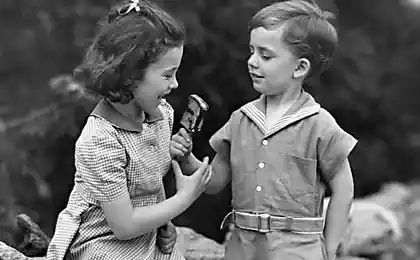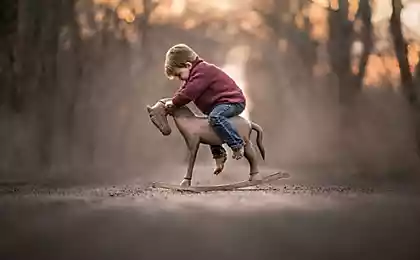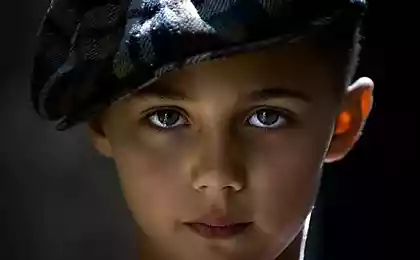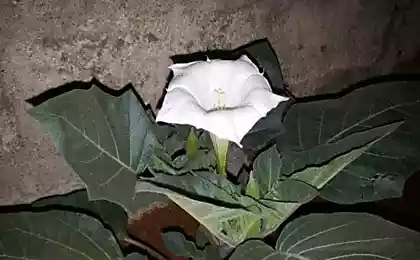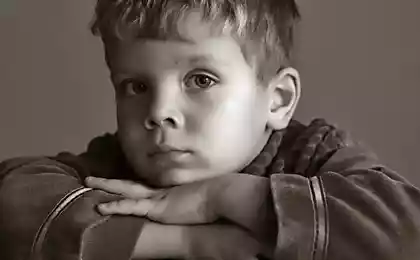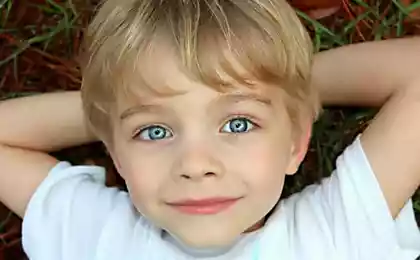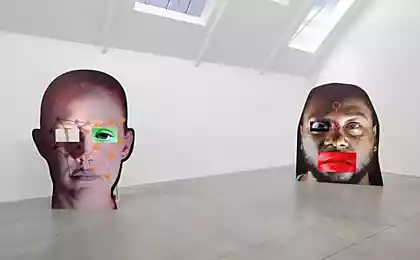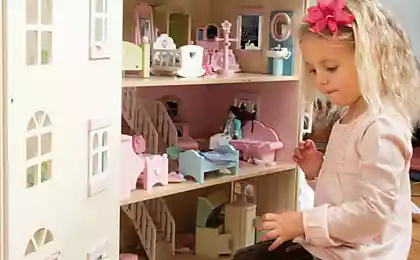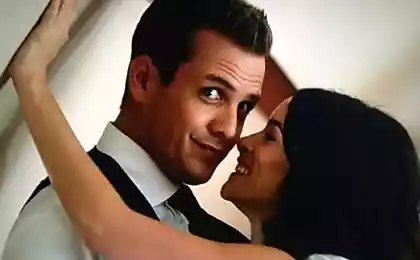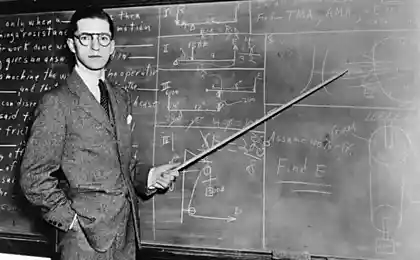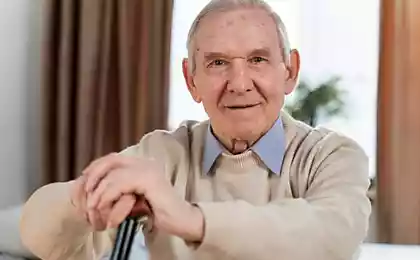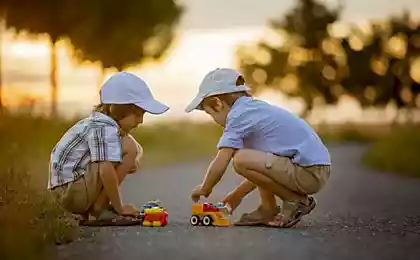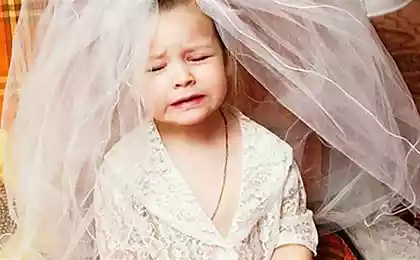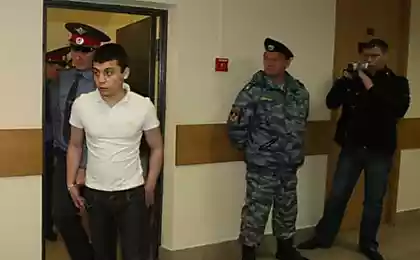1046
Boys majors
Ruling, as they say now, the elite of any country are people of flesh and blood. They are simple people and happens to be married, divorced, give birth and raise children.
Summer vacation in Sochi on the government dacha №9, 1934. Svetlana Stalin (in white dress), Stalin, the niece of his wife S.M.Budёnnogo, S.M.Budёnny, Vasily Stalin, Stalin's adopted son Artyom Sergeyev.
Completed - will tell.
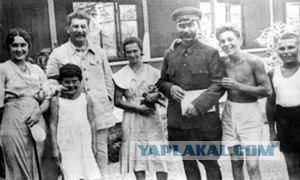
It is also no surprise that children grow up in the elite, more or less different from the conditions in which children grow ordinary people. There are a many reasons, including quite a objective: life in large cities, especially the capital, and the fact that some parents are protected persons, and the desire of others through the children "reach out" to his parents, and other, other, other ... However, as taught classics, is special, and is common. "Elite" young, like any other, is not averse to have fun, have a drink, take a walk with the opposite sex, commits reckless acts that seasoned age and experience of the person sometimes just not come to mind.
From this point of view the obvious bombastic Bolsheviks directed the construction and defense of the young Soviet state, too, were no exception. Without claiming to be comprehensive completeness, I would like to recall some of the brightest representatives of the first generation of boys-majors of the Soviet Union. Partying and adventures of some of them became legendary and overgrown with gossip. But they were not the main ones.
The Germans tried to use the fact of the captivity of Jacob Dzhugashvili in their propaganda, but without much success: emaciated man stubbornly refused to look into the camera (for all the time of captivity, he never looked never a photographer), does not look convincing contented with their lot.
Yakov Dzhugashvili (18.03.1907- 04.14.1943) - Joseph Stalin's eldest son by his first wife Ekaterina Svanidze. He graduated from the Higher Technical School in Moscow, then the Artillery Academy (5-year course passed for 2, 5 years). Captain Dzhugashvili entered into battle with the Germans June 24, 1941 as commander of the 6th Regiment of Artillery Howitzer Battery of the 14th Armored Division of the 7th Mechanized Corps of the 20th Army. For the battle of July 7, 1941 at p. Chernogostnitsa under Senno, Vitebsk region is presented an award along with several other men.
July 16 captured. Shot guard camp Sachsenhausen (possibly with committing suicide imitation attempts to escape).
In 1977 he was awarded the Order of the Patriotic War I degree posthumously.
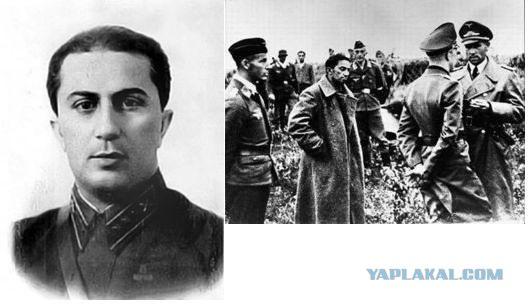
Vasily Stalin (03.24.1921 - 03.19.1962, Kazan) - Joseph Stalin's son by his second wife Nadezhda Alliluyeva. He graduated from the Kachin Red Banner Military Aviation School named. AF Myasnikov (last name - Kachin Higher Military Aviation School, created November 21 1910, disbanded November 1, 1998, but in 2010 the Minister of Defense Serdyukov, strengthening the Russian Air Force, renamed the Krasnodar Higher Military Aviation School in Kachin) .
By the beginning of the war - the captain, the pilot-inspector at the Main Staff of the Air Force. In January 1943, Colonel V.I.Stalin transferred to the army commander of the 32th Guards. IAP. During the command of the regiment carried out 27 sorties, he personally shot down two aircraft, including FW-190 (and, according to various sources, up to three - in the group). In May was dismissed for what happened in the on replenishment of the rear shelf tragic incident (fishing with shells RS-82 as a "silencing" one officer was killed, one flying ace was seriously wounded and later the reserve itself Basil received shrapnel leg injury). In 1944 he was appointed commander of the 3rd, February 1945 - 286th IAD. He was awarded two Orders of Red Banner, Order of Alexander Nevsky, Order of Suvorov II degree.
After the war - commander of the 1st Guards. ak, 1948 - Lieutenant General Aviation, Air Force Commander of the Moscow VO. Deputy of the Supreme Soviet of the USSR (1949), "curator" sports club CSKA sports complex and the BBC, the chairman of the Equestrian Federation of the USSR. Removed from office in May 1952, for the loss of two planes during the May Day parade air.
March 26, 1953 order of the Minister of Defense Bulganin transferred to the reserve without the right to wear military uniforms (for "moral decomposition of household") on April 28 the same year, was arrested, charged under Art. 58-1 (treason), 58-10 (anti-Soviet propaganda) and 193-17 (abuse of power) of the Criminal Code of the RSFSR, and in 1955 convicted ("special order", that is, without a lawyer) to 8 years in labor camp, but was kept in prison. Released early in January 1960, on a partial amnesty, changed the base transfer to the reserve, returned the right to wear a military uniform, a pension. April 16 the same year arrested by the KGB "for the continuation of anti-Soviet activities" and was in the Lefortovo prison until April 1961, then exiled to the closed city of Kazan for a period of 5 years. According to official reports, March 19, 1962 died of alcohol abuse.
In accordance with the current legislation of the Russian Federation should be recognized as a victim of political repression and rehabilitated posthumously on political charges.
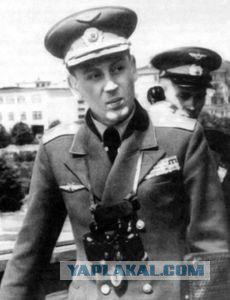
Artem Sergeev (03.05.1921 - 15.01.2008, Moscow) - the son of a revolutionary and statesman Theodore A. Sergeeva- "Artem", who died in 1921 in a train accident. Raised in a family of Stalin with his other children. In 1938, after the 10 classes of the 2nd Moscow Special Artillery School, he began his service in the Red Army. Promoted to sergeant, he entered the 2nd Leningrad Artillery School and graduated in 1940, lieutenant.
Entry into fighting June 26th, 1941 as platoon commander 152 mm howitzer M-10. He was captured, escaped, was in one of the guerrilla groups, launched the front line. Member of the defense of Stalingrad, the battle for the Dnieper, fighting in East Prussia, Germany, Hungary. In total there were 24 wounded, including two heavy: a bayonet in the belly, and the fragmentation of the hand. Victory met a lieutenant colonel, commander artbrigady. During the Great Patriotic War was awarded three Orders of the Red Banner, Order of Alexander Nevsky, two Orders of Patriotic War I degree, two Orders of Red Star and medals "For Service in Battle", "For the Defense of Moscow", "For defense of Stalingrad", "For the liberation of Warsaw "" For the Liberation of Prague "," For the capture of Koenigsberg. "
After the war he graduated from the Artillery Academy and the Military Academy named Voroshilov. He became one of the founders of the rocket and air defense forces of the USSR. He retired in 1981 as deputy inspector general of the organization for the air defense of the Warsaw Pact in the rank of Major General of Artillery.
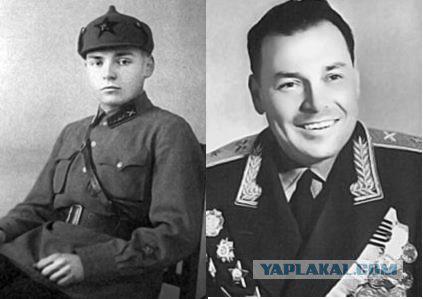
Stepan Mikoyan Anastasovich (12.07.1922-) - the son of Anastas Mikoyan - revolutionary party and state leader, a candidate member of the Politburo of the CPSU (b) since 1929, member of the Politburo since 1935, deputy chairman of the CPC in 1937, People's Commissar of Foreign Trade in 1938-1949, First Deputy Chairman of the Council of Ministers of the USSR in 1957-1964.
In the Red Army in 1940, together with a friend, Timur Frunze in 1941, he graduated from the Kachin Military Aviation School (see. Glaucus of V.I.Staline), Lieutenant. In the army since December 1941, fighter pilot 11 IAP, defending Moscow. At the 13th sortie mistakenly shot down his fighter was wounded. After recovering, he fought in the 32nd Guards. IAP at Stalingrad, but after the death of his brother in a dogfight Vladimir transferred to 12th Guards. IAP PVO Moscow.
After the war he graduated from the Zhukovsky VVIA and switched to flight-test work in the Air Force Institute Chkalov. Tested 102 types and modifications of aircraft, including the MiG-23, MiG-25, MiG-27, Su-15, Su-24. Since 1978 - the deputy. Director General for flight tests of the NGO "Lightning", participated in the creation and testing of the ship "Buran", directed the work on the orbital flying model "BOR-4". Since 1992 - in retirement.
Lieutenant General Aviation (1980), Honored Test Pilot of the USSR (1963), PhD (1980). For the development of new aircraft and for displaying courage in 1975 awarded the title Hero of the Soviet Union; awarded the Order of Lenin, the Order of the Red Banner, Order of the Patriotic War I level, four Orders of the Red Star.
He lives in Moscow.
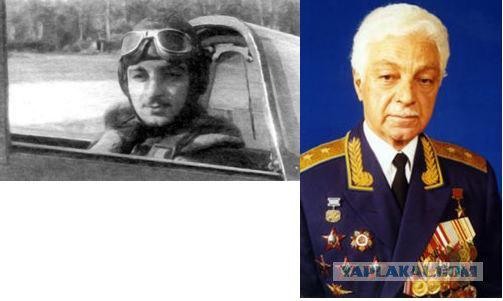
Vladimir Anastasovich Mikoyan (26.01.1924-18.09.1942) - the son of Anastas Mikoyan.
Since the beginning of the Great Patriotic War has made early enrollment in Kachin Military Aviation School (see. Glaucus of V.I.Staline) completed a crash course in February 1942, Lieutenant. Since September 1942 - fighter pilot 434 IAP. He was killed at Stalingrad in aerial combat in one of the first sorties. He was awarded the Order of the Red Banner posthumously.
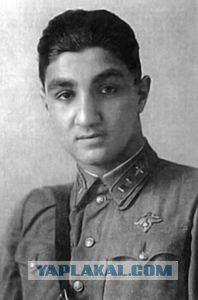
Alex Anastasovich Mikoyan (1925- 19.12.1986) - the son of Anastas Mikoyan.
In the Red Army in 1943, he graduated from the accelerated course Vyaznikovskaya VASHL. Member of the Great Patriotic War in September 1943 fought in the 12 th Guards. IAP PVO. After the war, he passed the external examinations for high school course, received the certificate - and one of the first Soviet pilots mastered jets. He took part in the flypast leading columns of the MiG-15. The first Soviet pilots shot down missiles "ground-to-air." He graduated from the Academy of Zhukovsky, the General Staff Academy. He also served as commander of the air force of the Central Asian VO, in 1978-1986 was a deputy. Head of Air Traffic Control Air Force, Lieutenant General of Aviation. Elected deputy of the Supreme Soviet of the USSR.
He was awarded two Orders of Red Banner, Order of the Red Banner, three Orders of the Red Star, Order of the Patriotic War I degree, the Order "For Service to Motherland in the Armed Forces» III degree.
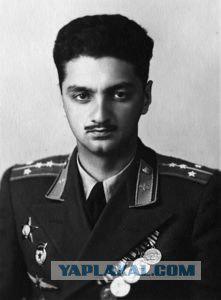
Timur Frunze Mikhailovich (04.05.1923 - 01.19.1942) - the son of Mikhail Frunze (1885-1925) - revolutionary, then a military commander, the chairman of the Revolutionary Military Council of the USSR People's Commissar for Military and Naval Affairs. Since 1931, raised in a family Voroshilov - People's Commissar for Military and Naval Affairs of the USSR (1925-1934), then People's Commissar of Defence of the USSR (1934-1940).
In the Red Army in 1940, along with other Stepan Mikoyan in 1941 graduated from the Kachin Military Aviation School (see. Glaucus of V.I.Staline), Lieutenant. In the army in January 1941 - the fighter pilot 161 IAP. 9 He made sorties to cover for ground troops in the area of Staraya Russa, he participated in three battles, shot down two German aircraft in the group. In battle, the pair Yakov 8 fighters killed by the Germans a direct hit in the head; the plane was set on fire, but did not explode in the fall, which allowed the burial of Lieutenant Frunze (first - in the village Kresttsy Leningrad region after the war, the remains were moved to Moscow at the Novodevichy klabische).
He was posthumously awarded the title Hero of the Soviet Union.
On the life of Timur Frunze tells filmed in 1974, directed Iey Mironova film "The boys of eighteen years." The role played by Timur Eugene Karelian. Will find - look, now such and such are not removed.
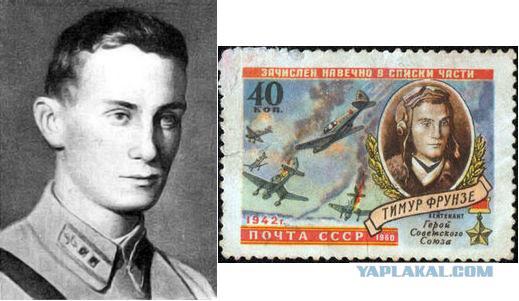
Alexander Shcherbakov (15.09.1925-) - son of Alexander Shcherbakov (1901-1945), secretary, first secretary of the various regional committees of the CPSU (b) since 1941 - 1 st Secretary of the CIM CPSU (b), the Secretary of the Central Committee of the CPSU (b) , 1942 - Colonel General, Chief of the General Political Department of the Red Army and the head of the Soviet Information Bureau.
In the Red Army in 1943, he graduated from the accelerated course Vyaznikovskaya VASHL. From September 1943 to October 1944 fighter pilot of the 12th Guards. IAP PVO Moscow. In October 1944 made the transfer to the front, he fought in the 176 th Guards. IAP. He flew 25 combat missions, conducted five air battles, shot down in group 1 German aircraft.
In 1951 he graduated from the Air Force Academy named after Zhukovsky and became a test pilot GK NII VVS. From 1953 to 1986 - in the flight-test work in the LII. Tested (including a corkscrew and critical modes) such aircraft as the MiG-17LL, MiG-19, Yak-25, Yak-27, MiG-21, Su-9, Yak-28, MiG-25, MiG-23 MiG-27, Su-24, Su-25.
Colonel Aviation, Honored Test Pilot of the USSR (1967), PhD (1986). For the development of new aircraft and for displaying courage in 1971 awarded the title Hero of the Soviet Union; awarded the Order of Lenin, the Order of the Red Banner, Order of the Red Banner, Order of the Patriotic War I and II degrees.
Retired since 1986, he worked as a senior engineer in the OKB Mikoyan. He lives in Moscow.
This - not the only children of the honorable parents of the Bolsheviks, who chose a profession that same - to defend their homeland. Pilots began two sons "chief infidel" Soviet Emelyan Mikhailovich Yaroslavsky (Menaion Izrailevich Gubelman, 1878-1943) - Vladimir and Yaroslavl Frunze, with Frunze Emelyanovich promoted to Major General Aviation.
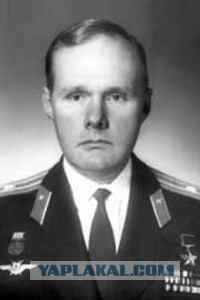
Friends cadets Kachi Timur Frunze, Stepan Mikoyan, Vladimir Yaroslavsky.
Fighter pilot became a friend of Alexey Mikoyan and Alexander Shcherbakov Leo Bulganin, the son of Nikolai Alexandrovich Bulganin, at different times - chairman of the USSR State Bank, the Minister of the Armed Forces, then - Defense, Chairman of the USSR Council of Ministers.
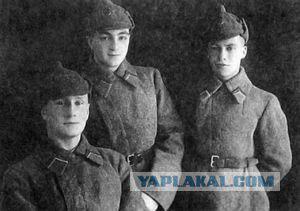
The pilots of the 12th Guards. IAP PVO Moscow, 1944 From left to right: Leo Bulganin, Vadim Ivanov, Alexander Shcherbakov, Alex Katrich Alexey Mikoyan.
More two sons Anastas Mikoyan - Vano (1927) and Sergei (1929-2010) have been accused of involvement in several dozen participants of the "anti-Soviet youth organization." This conclusion came Vlodzimirsky investigator, investigating the murder of an underage daughter appointed ambassador to Mexico K.A.Umanskogo minor son of People's Commissar of Aviation Industry A.I.Shahurina Vladimir, after killing shot. Vano and Sergo have stayed six months on remand at the Lubyanka and spent a year in exile in Stalinabad (Dushanbe), then Vano (Ivan) Mikoyan graduated from the military aviation school of mechanics, then - VVIA Zhukovsky and became an aircraft, he worked in OKB his uncle Artem Mikoyan and participated in the development of MiG-21 and MiG-29. And Sergo Mikoyan, in 1952 he graduated from the Moscow State Institute and became a prominent Soviet specialist on Latin America.
Vyaznikovsky Air Force Pilot School graduated and became a fighter Boris Bochkov (1924-1991) - the son of the Prosecutor of the USSR in 1940-1941 and 1942-1943, Victor M. Bochkova (1900-1981). Subsequently, he became the commander of the Moscow Air Defense District, Deputy Commander of the Air Defense of the USSR, Colonel-General, was a member of the Central Auditing Commission of the CPSU Central Committee, was elected to the Supreme Soviet of the USSR.
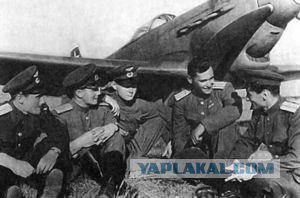
Alexander and Arkady Chapayev.
Sons became officers of the legendary Civil War hero Vasily Chapayev (1887-1919). Senior Alexander Chapaev (1910-1985) chose artillery, went through the war and took part in the exercises on Totsky range in 1954, was the chief of artillery of the Volga, then Moscow BO, retired Major General of Artillery. To see it, by the way, it is possible in a documentary about twice Hero of the Soviet Union Gen. Petrov (link to the film in the end notes). Junior Arkady Chapayev (1914-1939) became a military pilot and ending the program of the first course at the Air Force Academy of the Red Army, performing official flight to aerobatics, being very experienced pilot, for unknown reasons he did not have time or could not bring I-16 from the spin .
I will conclude with a single characteristic letter. It is, I think, helps us to understand what the characters were thinking this note - when thinking about seriously.
Letter cadet school Kachin Timur Frunze adoptive father - the deputy. Chairman of People's Commissars of the USSR, the chairman of the Defense Committee at SNK Marshal Voroshilov:
Hello, dear Voroshilov! Perhaps surprised that I suddenly a frequent letters. Unfortunately, this time I want to talk to you about the case very still important to me. In short, there is a possibility that the release of our draw it is now just a few months, of course, we are not smiling. But here's the thing - the school does not gasoline. For us it is very important, and so I try to tell everything in order.
You see, our stay in the camp, and so valuable that everything has been done to facilitate the flight personnel training. I have already said that we will provide an excellent free airfields, while at Kutch Squadron idle for weeks waiting for their turn to departure. (After all, the number of students in the school this year increased almost twice). Thus, lёtnuyu program you can go to the camp for a month, the school would have to take place 2-3 months.
We now return to the main.
Last time we were days when half the camp was forced to dig ditches instead of flying. There was a shortage of gasoline. Time wasted, while the deadline for the collection of the camp became closer. After all, the camp is given at our disposal only on June 1. And then we will have to cede it to other squadrons.
And finally, on 24 flights in the school have been terminated. No gasoline! Of course, we have built different assumptions that could cause the Kachin school sit gasoline, blamed almost international situation, etc.
Source:
Summer vacation in Sochi on the government dacha №9, 1934. Svetlana Stalin (in white dress), Stalin, the niece of his wife S.M.Budёnnogo, S.M.Budёnny, Vasily Stalin, Stalin's adopted son Artyom Sergeyev.
Completed - will tell.

It is also no surprise that children grow up in the elite, more or less different from the conditions in which children grow ordinary people. There are a many reasons, including quite a objective: life in large cities, especially the capital, and the fact that some parents are protected persons, and the desire of others through the children "reach out" to his parents, and other, other, other ... However, as taught classics, is special, and is common. "Elite" young, like any other, is not averse to have fun, have a drink, take a walk with the opposite sex, commits reckless acts that seasoned age and experience of the person sometimes just not come to mind.
From this point of view the obvious bombastic Bolsheviks directed the construction and defense of the young Soviet state, too, were no exception. Without claiming to be comprehensive completeness, I would like to recall some of the brightest representatives of the first generation of boys-majors of the Soviet Union. Partying and adventures of some of them became legendary and overgrown with gossip. But they were not the main ones.
The Germans tried to use the fact of the captivity of Jacob Dzhugashvili in their propaganda, but without much success: emaciated man stubbornly refused to look into the camera (for all the time of captivity, he never looked never a photographer), does not look convincing contented with their lot.
Yakov Dzhugashvili (18.03.1907- 04.14.1943) - Joseph Stalin's eldest son by his first wife Ekaterina Svanidze. He graduated from the Higher Technical School in Moscow, then the Artillery Academy (5-year course passed for 2, 5 years). Captain Dzhugashvili entered into battle with the Germans June 24, 1941 as commander of the 6th Regiment of Artillery Howitzer Battery of the 14th Armored Division of the 7th Mechanized Corps of the 20th Army. For the battle of July 7, 1941 at p. Chernogostnitsa under Senno, Vitebsk region is presented an award along with several other men.
July 16 captured. Shot guard camp Sachsenhausen (possibly with committing suicide imitation attempts to escape).
In 1977 he was awarded the Order of the Patriotic War I degree posthumously.

Vasily Stalin (03.24.1921 - 03.19.1962, Kazan) - Joseph Stalin's son by his second wife Nadezhda Alliluyeva. He graduated from the Kachin Red Banner Military Aviation School named. AF Myasnikov (last name - Kachin Higher Military Aviation School, created November 21 1910, disbanded November 1, 1998, but in 2010 the Minister of Defense Serdyukov, strengthening the Russian Air Force, renamed the Krasnodar Higher Military Aviation School in Kachin) .
By the beginning of the war - the captain, the pilot-inspector at the Main Staff of the Air Force. In January 1943, Colonel V.I.Stalin transferred to the army commander of the 32th Guards. IAP. During the command of the regiment carried out 27 sorties, he personally shot down two aircraft, including FW-190 (and, according to various sources, up to three - in the group). In May was dismissed for what happened in the on replenishment of the rear shelf tragic incident (fishing with shells RS-82 as a "silencing" one officer was killed, one flying ace was seriously wounded and later the reserve itself Basil received shrapnel leg injury). In 1944 he was appointed commander of the 3rd, February 1945 - 286th IAD. He was awarded two Orders of Red Banner, Order of Alexander Nevsky, Order of Suvorov II degree.
After the war - commander of the 1st Guards. ak, 1948 - Lieutenant General Aviation, Air Force Commander of the Moscow VO. Deputy of the Supreme Soviet of the USSR (1949), "curator" sports club CSKA sports complex and the BBC, the chairman of the Equestrian Federation of the USSR. Removed from office in May 1952, for the loss of two planes during the May Day parade air.
March 26, 1953 order of the Minister of Defense Bulganin transferred to the reserve without the right to wear military uniforms (for "moral decomposition of household") on April 28 the same year, was arrested, charged under Art. 58-1 (treason), 58-10 (anti-Soviet propaganda) and 193-17 (abuse of power) of the Criminal Code of the RSFSR, and in 1955 convicted ("special order", that is, without a lawyer) to 8 years in labor camp, but was kept in prison. Released early in January 1960, on a partial amnesty, changed the base transfer to the reserve, returned the right to wear a military uniform, a pension. April 16 the same year arrested by the KGB "for the continuation of anti-Soviet activities" and was in the Lefortovo prison until April 1961, then exiled to the closed city of Kazan for a period of 5 years. According to official reports, March 19, 1962 died of alcohol abuse.
In accordance with the current legislation of the Russian Federation should be recognized as a victim of political repression and rehabilitated posthumously on political charges.

Artem Sergeev (03.05.1921 - 15.01.2008, Moscow) - the son of a revolutionary and statesman Theodore A. Sergeeva- "Artem", who died in 1921 in a train accident. Raised in a family of Stalin with his other children. In 1938, after the 10 classes of the 2nd Moscow Special Artillery School, he began his service in the Red Army. Promoted to sergeant, he entered the 2nd Leningrad Artillery School and graduated in 1940, lieutenant.
Entry into fighting June 26th, 1941 as platoon commander 152 mm howitzer M-10. He was captured, escaped, was in one of the guerrilla groups, launched the front line. Member of the defense of Stalingrad, the battle for the Dnieper, fighting in East Prussia, Germany, Hungary. In total there were 24 wounded, including two heavy: a bayonet in the belly, and the fragmentation of the hand. Victory met a lieutenant colonel, commander artbrigady. During the Great Patriotic War was awarded three Orders of the Red Banner, Order of Alexander Nevsky, two Orders of Patriotic War I degree, two Orders of Red Star and medals "For Service in Battle", "For the Defense of Moscow", "For defense of Stalingrad", "For the liberation of Warsaw "" For the Liberation of Prague "," For the capture of Koenigsberg. "
After the war he graduated from the Artillery Academy and the Military Academy named Voroshilov. He became one of the founders of the rocket and air defense forces of the USSR. He retired in 1981 as deputy inspector general of the organization for the air defense of the Warsaw Pact in the rank of Major General of Artillery.

Stepan Mikoyan Anastasovich (12.07.1922-) - the son of Anastas Mikoyan - revolutionary party and state leader, a candidate member of the Politburo of the CPSU (b) since 1929, member of the Politburo since 1935, deputy chairman of the CPC in 1937, People's Commissar of Foreign Trade in 1938-1949, First Deputy Chairman of the Council of Ministers of the USSR in 1957-1964.
In the Red Army in 1940, together with a friend, Timur Frunze in 1941, he graduated from the Kachin Military Aviation School (see. Glaucus of V.I.Staline), Lieutenant. In the army since December 1941, fighter pilot 11 IAP, defending Moscow. At the 13th sortie mistakenly shot down his fighter was wounded. After recovering, he fought in the 32nd Guards. IAP at Stalingrad, but after the death of his brother in a dogfight Vladimir transferred to 12th Guards. IAP PVO Moscow.
After the war he graduated from the Zhukovsky VVIA and switched to flight-test work in the Air Force Institute Chkalov. Tested 102 types and modifications of aircraft, including the MiG-23, MiG-25, MiG-27, Su-15, Su-24. Since 1978 - the deputy. Director General for flight tests of the NGO "Lightning", participated in the creation and testing of the ship "Buran", directed the work on the orbital flying model "BOR-4". Since 1992 - in retirement.
Lieutenant General Aviation (1980), Honored Test Pilot of the USSR (1963), PhD (1980). For the development of new aircraft and for displaying courage in 1975 awarded the title Hero of the Soviet Union; awarded the Order of Lenin, the Order of the Red Banner, Order of the Patriotic War I level, four Orders of the Red Star.
He lives in Moscow.

Vladimir Anastasovich Mikoyan (26.01.1924-18.09.1942) - the son of Anastas Mikoyan.
Since the beginning of the Great Patriotic War has made early enrollment in Kachin Military Aviation School (see. Glaucus of V.I.Staline) completed a crash course in February 1942, Lieutenant. Since September 1942 - fighter pilot 434 IAP. He was killed at Stalingrad in aerial combat in one of the first sorties. He was awarded the Order of the Red Banner posthumously.

Alex Anastasovich Mikoyan (1925- 19.12.1986) - the son of Anastas Mikoyan.
In the Red Army in 1943, he graduated from the accelerated course Vyaznikovskaya VASHL. Member of the Great Patriotic War in September 1943 fought in the 12 th Guards. IAP PVO. After the war, he passed the external examinations for high school course, received the certificate - and one of the first Soviet pilots mastered jets. He took part in the flypast leading columns of the MiG-15. The first Soviet pilots shot down missiles "ground-to-air." He graduated from the Academy of Zhukovsky, the General Staff Academy. He also served as commander of the air force of the Central Asian VO, in 1978-1986 was a deputy. Head of Air Traffic Control Air Force, Lieutenant General of Aviation. Elected deputy of the Supreme Soviet of the USSR.
He was awarded two Orders of Red Banner, Order of the Red Banner, three Orders of the Red Star, Order of the Patriotic War I degree, the Order "For Service to Motherland in the Armed Forces» III degree.

Timur Frunze Mikhailovich (04.05.1923 - 01.19.1942) - the son of Mikhail Frunze (1885-1925) - revolutionary, then a military commander, the chairman of the Revolutionary Military Council of the USSR People's Commissar for Military and Naval Affairs. Since 1931, raised in a family Voroshilov - People's Commissar for Military and Naval Affairs of the USSR (1925-1934), then People's Commissar of Defence of the USSR (1934-1940).
In the Red Army in 1940, along with other Stepan Mikoyan in 1941 graduated from the Kachin Military Aviation School (see. Glaucus of V.I.Staline), Lieutenant. In the army in January 1941 - the fighter pilot 161 IAP. 9 He made sorties to cover for ground troops in the area of Staraya Russa, he participated in three battles, shot down two German aircraft in the group. In battle, the pair Yakov 8 fighters killed by the Germans a direct hit in the head; the plane was set on fire, but did not explode in the fall, which allowed the burial of Lieutenant Frunze (first - in the village Kresttsy Leningrad region after the war, the remains were moved to Moscow at the Novodevichy klabische).
He was posthumously awarded the title Hero of the Soviet Union.
On the life of Timur Frunze tells filmed in 1974, directed Iey Mironova film "The boys of eighteen years." The role played by Timur Eugene Karelian. Will find - look, now such and such are not removed.

Alexander Shcherbakov (15.09.1925-) - son of Alexander Shcherbakov (1901-1945), secretary, first secretary of the various regional committees of the CPSU (b) since 1941 - 1 st Secretary of the CIM CPSU (b), the Secretary of the Central Committee of the CPSU (b) , 1942 - Colonel General, Chief of the General Political Department of the Red Army and the head of the Soviet Information Bureau.
In the Red Army in 1943, he graduated from the accelerated course Vyaznikovskaya VASHL. From September 1943 to October 1944 fighter pilot of the 12th Guards. IAP PVO Moscow. In October 1944 made the transfer to the front, he fought in the 176 th Guards. IAP. He flew 25 combat missions, conducted five air battles, shot down in group 1 German aircraft.
In 1951 he graduated from the Air Force Academy named after Zhukovsky and became a test pilot GK NII VVS. From 1953 to 1986 - in the flight-test work in the LII. Tested (including a corkscrew and critical modes) such aircraft as the MiG-17LL, MiG-19, Yak-25, Yak-27, MiG-21, Su-9, Yak-28, MiG-25, MiG-23 MiG-27, Su-24, Su-25.
Colonel Aviation, Honored Test Pilot of the USSR (1967), PhD (1986). For the development of new aircraft and for displaying courage in 1971 awarded the title Hero of the Soviet Union; awarded the Order of Lenin, the Order of the Red Banner, Order of the Red Banner, Order of the Patriotic War I and II degrees.
Retired since 1986, he worked as a senior engineer in the OKB Mikoyan. He lives in Moscow.
This - not the only children of the honorable parents of the Bolsheviks, who chose a profession that same - to defend their homeland. Pilots began two sons "chief infidel" Soviet Emelyan Mikhailovich Yaroslavsky (Menaion Izrailevich Gubelman, 1878-1943) - Vladimir and Yaroslavl Frunze, with Frunze Emelyanovich promoted to Major General Aviation.

Friends cadets Kachi Timur Frunze, Stepan Mikoyan, Vladimir Yaroslavsky.
Fighter pilot became a friend of Alexey Mikoyan and Alexander Shcherbakov Leo Bulganin, the son of Nikolai Alexandrovich Bulganin, at different times - chairman of the USSR State Bank, the Minister of the Armed Forces, then - Defense, Chairman of the USSR Council of Ministers.

The pilots of the 12th Guards. IAP PVO Moscow, 1944 From left to right: Leo Bulganin, Vadim Ivanov, Alexander Shcherbakov, Alex Katrich Alexey Mikoyan.
More two sons Anastas Mikoyan - Vano (1927) and Sergei (1929-2010) have been accused of involvement in several dozen participants of the "anti-Soviet youth organization." This conclusion came Vlodzimirsky investigator, investigating the murder of an underage daughter appointed ambassador to Mexico K.A.Umanskogo minor son of People's Commissar of Aviation Industry A.I.Shahurina Vladimir, after killing shot. Vano and Sergo have stayed six months on remand at the Lubyanka and spent a year in exile in Stalinabad (Dushanbe), then Vano (Ivan) Mikoyan graduated from the military aviation school of mechanics, then - VVIA Zhukovsky and became an aircraft, he worked in OKB his uncle Artem Mikoyan and participated in the development of MiG-21 and MiG-29. And Sergo Mikoyan, in 1952 he graduated from the Moscow State Institute and became a prominent Soviet specialist on Latin America.
Vyaznikovsky Air Force Pilot School graduated and became a fighter Boris Bochkov (1924-1991) - the son of the Prosecutor of the USSR in 1940-1941 and 1942-1943, Victor M. Bochkova (1900-1981). Subsequently, he became the commander of the Moscow Air Defense District, Deputy Commander of the Air Defense of the USSR, Colonel-General, was a member of the Central Auditing Commission of the CPSU Central Committee, was elected to the Supreme Soviet of the USSR.

Alexander and Arkady Chapayev.
Sons became officers of the legendary Civil War hero Vasily Chapayev (1887-1919). Senior Alexander Chapaev (1910-1985) chose artillery, went through the war and took part in the exercises on Totsky range in 1954, was the chief of artillery of the Volga, then Moscow BO, retired Major General of Artillery. To see it, by the way, it is possible in a documentary about twice Hero of the Soviet Union Gen. Petrov (link to the film in the end notes). Junior Arkady Chapayev (1914-1939) became a military pilot and ending the program of the first course at the Air Force Academy of the Red Army, performing official flight to aerobatics, being very experienced pilot, for unknown reasons he did not have time or could not bring I-16 from the spin .
I will conclude with a single characteristic letter. It is, I think, helps us to understand what the characters were thinking this note - when thinking about seriously.
Letter cadet school Kachin Timur Frunze adoptive father - the deputy. Chairman of People's Commissars of the USSR, the chairman of the Defense Committee at SNK Marshal Voroshilov:
Hello, dear Voroshilov! Perhaps surprised that I suddenly a frequent letters. Unfortunately, this time I want to talk to you about the case very still important to me. In short, there is a possibility that the release of our draw it is now just a few months, of course, we are not smiling. But here's the thing - the school does not gasoline. For us it is very important, and so I try to tell everything in order.
You see, our stay in the camp, and so valuable that everything has been done to facilitate the flight personnel training. I have already said that we will provide an excellent free airfields, while at Kutch Squadron idle for weeks waiting for their turn to departure. (After all, the number of students in the school this year increased almost twice). Thus, lёtnuyu program you can go to the camp for a month, the school would have to take place 2-3 months.
We now return to the main.
Last time we were days when half the camp was forced to dig ditches instead of flying. There was a shortage of gasoline. Time wasted, while the deadline for the collection of the camp became closer. After all, the camp is given at our disposal only on June 1. And then we will have to cede it to other squadrons.
And finally, on 24 flights in the school have been terminated. No gasoline! Of course, we have built different assumptions that could cause the Kachin school sit gasoline, blamed almost international situation, etc.
Source:
